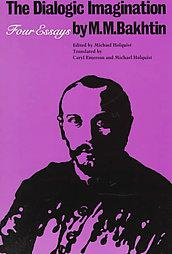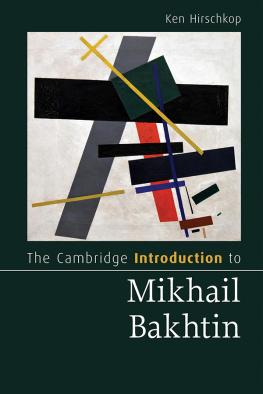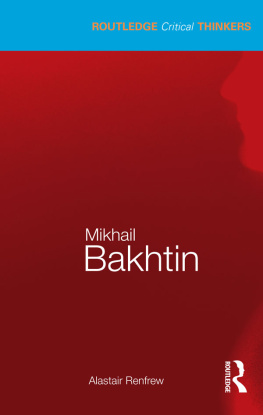Robert L. Belknap
Edward J. Brown
Robert L. Jackson
I. R. Titunik
M. M. BAKHTIN






There is nothing more fragile than the word, and Bakhtin's was almost lost. This translation is dedicated to those devoted Russian scholars who gave so generously of themselves to Mikhail Mikhailovich the man and to the cause of preserving dialogue.

Thanks are due first of all to the Executors of the Bakhtin Archives, Vadim Koiinov and Sergej Bocorov. Their devotion to Bakhtin is matched only by their generosity toward those who would study him. To I. R. Titunik we owe a special debt of gratitude. He read large parts of the first draft of this translation and if, as we hope, there were improvements in subsequent drafts, it is because we constantly had his image before us, the threat of one of his red-penciled "ughs" or "cute, but wrong, utterly wrong" in the margin. The high standard of scholarship as well as translation that he has established in his own work was a constant inspiration to us. He did not see the final version and therefore cannot be charged with any inaccuracies, all of which are our own responsibility. Thanks also to the many scholars from various departments who helped us in the task of identifying some of Bakhtin's more recherche examples: to Millicent Marcus in Italian; Robert Hill in French; James Wimsatt, Medievalist, in English; Robert Mollenauer in German; Michael Gagarin and Carl Rubino in Classics, all of the University of Texas. Thanks also to Vadim Liapunov of the Slavic Department, Indiana University, to whom we turned when all else failed. We are grateful as well to Ilya Levin and Sofia Nikonova who played the role of native speakers, with resource and wit.
Preparation of the manuscript was particularly complex due to the many languages, two sets of footnotes and so forth. We could not have done it without Elaine Hamilton. The person who has borne with this for three years now and still had the patience and dedication to come in on weekends when it was necessary to retype yet another version of some arcane passage is Gianna Kirtley. The National Endowment for the Humanities and the University Research Institute at the University of Texas provided generous grants to support this translation.
This book is also a sponsored activity of the Institute of Modern Russian Culture at Blue Lagoon, Texas.
Thanks as always to Katerina Clark, who was ready to give help whenever it was needed, whether it was a technical term in Russian or a word of encouragement in English. Thanks to Snugli Cottage Industries. Thanks finally to the anonymous donor whose Medician gesture made not only this book but the whole series in which it appears possible.
The IPA transcription system is used in this book, except in those cases where a word or a name has entered general English usage via another system (i.e., Bakhtin, not Baxtin).
Bakhtin's footnotes are indicated by superscript numbers; the editor's footnotes are indicated by superscript letters.
This book contains four essays that originally appeared in Voprosy literatury i estetiki (Moscow, 1975). Two additional essays are not included here, because they either have already been translated into English or do not bear directly on the theme unifying the other four, the novel and its relation to language.
The "Translator's Note" to non-Russian versions of Bakhtin's works has become a genre in its own right. More often than not, the peculiarity of Bakhtin's Russian is invoked to justify a certain awkwardness in the translated text. We believe the matter is more complicated. Bakhtin himself provides the best context for perceiving the true nature of the problem in the distinction he draws between "style" and "language"-especially as it pertains to the "image of a language." We have sought to make a translation at the level of images of a whole language (obraz jazyka).
The translations are complete. Bakhtin is not an efficient writer, but we believe he pays his way.
Since junior members of team projects frequently receive less credit than is their due, I wish to emphasize that this translation is the result of a real dialogue: Caryl Emerson and I went over every word of Bakhtin's text together.
MICHAEL HOLQUIST
I
Mikhail Mikhailovich Bakhtin is gradually emerging as one of the leading thinkers of the twentieth century. This claim will strike many as extravagant, since a number of factors have until recently conspired to obscure his importance. Beyond the difficulties usually attending the careers of powerful but eccentric thinkers, there are, in Bakhtin's case, complications that are unique. Some of these inhere in his times: his two most productive periods occurred during the darkest years of recent Russian history: the decade following 1917, when the country reeled under the combined effects of a lost war, revolution, civil war and famine; and the following decade, the thirties, when Bakhtin was in exile in Kazakhstan, and most of the rest of Russia was huddling through the long Stalinist night. It was in these years that Bakhtin wrote something on the order of nine large books on topics as major and varied as Freud, Marx and the philosophy of language. Only one of these (the Dostoevsky book) appeared under his own name during these years. Three others were published under different names (see section III of this introduction); some were partially lost during his forced moves; some disappeared when the Nazis burned down the publishing house that had accepted his large manuscript on the Erziehungsroman; some were "delayed" forty-one years in their publication when journals that had accepted manuscripts were shut down, as happened to the Russian Contemporary in 1924; others, such as the Rabelais book, were considered too aberrant for publication, due to their emphasis on sex and body functions (see section II of this introduction).













